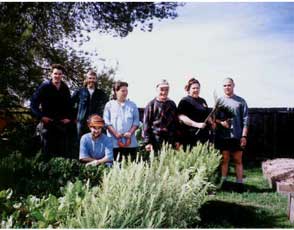| Our Environment: Issue 24 Spring 2000 |
| Composted
kitchen scraps used in the City’s community gardens is reducing the volume of organic
waste dumped in the Burwood Landfill and helping to build a sense of community. Last year’s trial, involving four gardens, was so successful that the Christchurch City Council has earmarked $50,000 for the Community Garden Project. It has also told those involved in the project that they can use a large plot of land beside the Linwood Service Centre for more gardens.The land was formerly part of the Council’s Linwood Nursery. Sue Wilkinson, the Practical Resource Co-ordinator at the nearby Linwood Resource Centre, is delighted with the extra land for community gardens. “It will give all the groups involved a chance to work closely together,” she says. Their centre was involved in the trial. “It worked really well. About 20 people brought their scraps in weekly and later took away the compost.” |
 Sue Wilkinson and others in the Linwood Resource Centre Team |
At present the centre is receiving about 12 to 13 buckets of scraps a week to compost for its community garden. People working in the gardens have first pick of the vegetables. Sue says the aim of the garden is to help people become more self sufficient within themselves, foster community spirit and pass on knowledge and information to each other.
The four gardens involved in the pilot project - in Linwood Avenue, Pages Road, Strickland Street and Surrey Street - were originally setup by community groups wanting to grow vegetables for the local community. The Council’s Waste Unit began working with them to help reduce the amount of organic waste sent to the landfill. Kitchen and garden waste currently makes up almost half the waste currently collected in black Council rubbish bags and 65 per cent of waste in wheelie bins and 44 gallon drums.
Solid Waste Engineer Eric Park says disposal of organic waste in landfills causes problems because it breaks down and creates leachate and gas. “This stuff needs to be composted to get the benefits,” he says. “Diverting the waste through these projects is just one of the ways we can all make a real difference to help the environment.” During the trial, an average of 3-5kg per week of kitchen waste was collected from each of the 45 households involved and composted in the four gardens over three months.
The University of Canterbury’s recycling section is planning to start a community garden on campus. Each of the Council’s six Community Boards is being asked to foster at least one community garden in its area. It is hoped that these initiatives will encourage similar gardens to spring up all round the City.
| Our Environment Index |